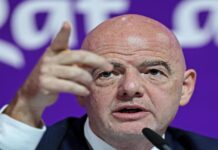The killing of ISIS leader Abu Bakr al-Baghdadi is a big deal in the fight against terrorism—but not as big a deal as President Donald Trump made it out to be in his 50-minute press conference on Sunday morning.
It is a big deal, as an act of justice, because Baghdadi had murdered and brutalized so many people in his quest—for a while, quite successful—to claim a swath of Iraq and Syria as a caliphate and himself as its holy leader.
It is a big deal as an elaborate operation involving special operations forces, intelligence from at least a few countries, and coordination from several more. Trump thanked Russia, Iraq, and Turkey—for allowing U.S. forces to operate in an area of northwestern Syria, where they had never had much presence—as well as the Syrian Kurds, leaving unmentioned the fact that, given his abandonment of them earlier this month, they are unlikely to be so helpful in the future.
But the killing is less of a big deal because, not least, as Trump has boasted on previous occasions, ISIS had already been severely reduced in stature and was no longer such a centralized organization. Its members still carried out terrorist activities, but Baghdadi no longer directed them to the degree he once had.
Bruce Hoffman, a specialist on terrorism at Georgetown University, said in an email Sunday morning that Baghdadi’s death may merely drive “the remaining ISIS forces into an alliance with al-Qaida”—which has experienced a bit of a revival in recent years.
ISIS began, after all, as a splinter group from al-Qaida. The two groups still have many ideological similarities; “their estrangement,” Hoffman said, “was always the product of an outsize clash of egos of its two leaders”—Baghdadi and al-Qaida leader Ayman al-Zawahiri—“rather than substantive divisions or core beliefs.” A modus vivendi between the two groups is particularly plausible, Hoffman said, because Baghdadi’s strategy ultimately proved far less successful than “al-Qaida’s long-standing counsels for strategic patience, which have resulted in both its resilience and consolidated presence in Idlib province”—the last remaining rebel stronghold in Western Syria.
In any case, Hoffman added, the militants in both al-Qaida and ISIS “regard their struggle as divinely ordained,” so “the death of a mere mortal”—even one as charismatic as Baghdadi or bin Laden (who, at the time of the raid on his compound, was much more powerful)—“is inconsequential.”
In short, Trump’s triumphalism may prove as short-sighted as that of his predecessors. Hoffman said, “This has always been the problem with our approach to counterterrorism: the temptation to declare victory again and again, especially given our electoral cycle”—for instance, George W. Bush’s “Mission Accomplished” banner after toppling Saddam Hussein in 2003, and the celebrations surrounding Barack Obama’s announcement of Osama bin Laden’s killing in 2011.
Trump’s special brand of triumphalism might also sour what could otherwise have been a much-needed moment of success amid the House impeachment hearings. When Obama appeared on nationwide television, for nine minutes, to announce bin Laden’s death, some Republican critics denounced him for what they saw as his self-congratulation. Trump tweeted at the time, “Stop congratulating Obama for killing bin Laden. The Navy Seals killed bin Laden.”
Cut to seven years later, almost to the day, and, in his 50-minute Sunday-morning news conference, not only did Trump take credit for killing Baghdadi, he reveled in the act, describing the terrorist leader as “whimpering and crying and screaming all the way” as special forces and dogs chased him to the end of a tunnel, where he detonated a suicide vest, killing himself and three of his children, dying “like a dog … like a coward.”
Trump also boasted that killing Baghdadi was a bigger deal than killing bin Laden—which is to say, that Donald Trump is a bigger deal than Barack Obama. “This is the biggest there is,” Trump said. “This is the worst ever. Osama bin Laden was big, but Osama bin Laden became big with the World Trade Center. This is a man who built a whole, as he would like to call it, a country.”
Trump also claimed credit, as he has in the past, for warning about bin Laden in a book published a year before the 9/11 attack, when as he put it, almost no one had heard of al-Qaida. (He also, while on the subject of his books, noted that he’d written 12 of them, and “all of them did well.”) But in fact, this book, called The America We Deserve, only fleetingly mentioned bin Laden, who, in any case, was already quite well-known as the result of his earlier attack on the World Trade Center in 1993.
Trump may hope to garner some political favor from the killing. But the gain is likely to be minimal. Harry Enten, CNN’s pollster, tweeted Sunday morning that the bin Laden raid gave Obama an “approval boost” that “lasted maybe a few weeks”—and that raid was widely viewed as the final revenge for bin Laden’s murder of 3,000 Americans. Baghdadi is less of a household name, and Trump’s repeated claims that he’d destroyed ISIS already may have blunted the killing’s political impact.
Finally, and most puzzling, following his announcement, Trump repeated his claim that U.S. troops control Syria’s oil fields (which is untrue) and that he might invite companies like ExxonMobil to come in and drill (which they have neither the legal right nor the remotest desire to do). All of which raises, once again, the question: Is Trump putting more troops in Syria? Is he taking them out? And, whatever the case may be, why?

















